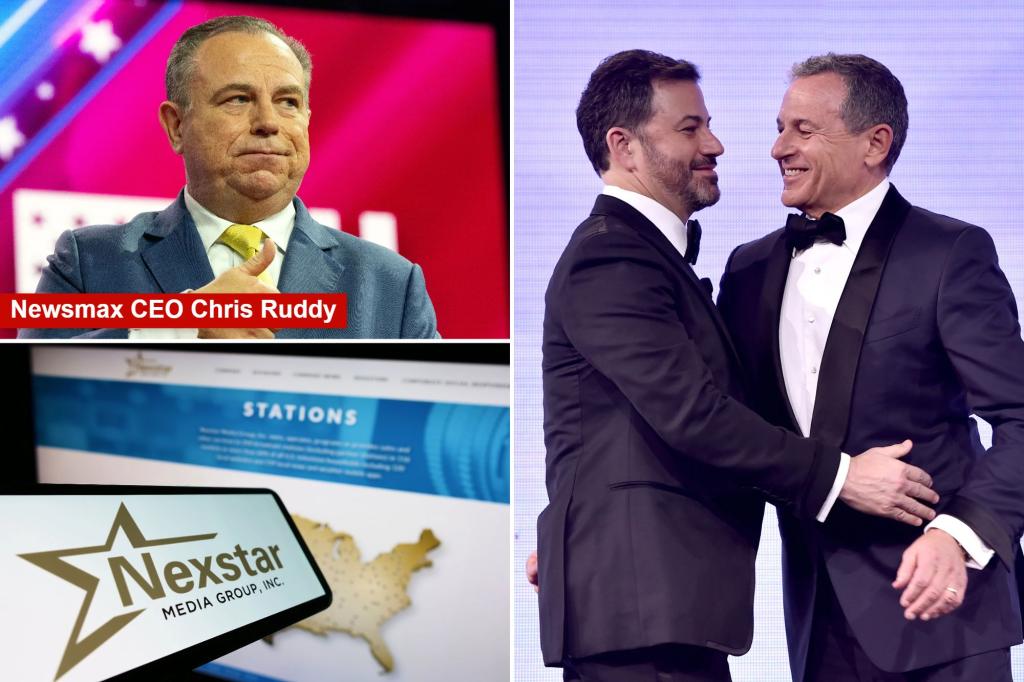Disney and Nexstar at Odds: The Kimmel Controversy and Media Consolidation
In a dramatic turn of events, Nexstar Media’s decision to continue suspending “Jimmy Kimmel Live!” from its ABC affiliate stations has created significant tension with Disney CEO Bob Iger. However, this public stance may not be enough to secure regulatory approval for Nexstar’s ambitious $6.2 billion acquisition of rival broadcaster Tegna. The situation highlights the complex intersection of media politics, corporate strategy, and government regulation in today’s polarized landscape.
The controversy began when Kimmel made false claims about Charlie Kirk’s alleged assassin, suggesting the “MAGA gang” was trying to portray the assailant as someone outside their group. After ABC temporarily suspended Kimmel, he returned to air without offering an apology for these statements. This prompted Nexstar, which owns approximately three dozen ABC affiliates, to announce its continued suspension of Kimmel’s show while it evaluates the situation. The company stated it is engaged in “productive discussions” with Disney executives, emphasizing its focus on ensuring programming “reflects and respects the diverse interests of the communities we serve.” This move represents a significant challenge to Disney’s content authority and has created a visible rift between the media giants.
The timing of Nexstar’s stance against Kimmel has raised eyebrows among industry insiders, who view it as potentially strategic posturing while the company seeks approval for its Tegna acquisition. The merger faces substantial opposition from Republicans in Congress and conservative news networks, particularly Newsmax, whose CEO Chris Ruddy maintains close relationships with top GOP lawmakers and former President Trump. Critics argue that Nexstar’s suspension of Kimmel is merely a calculated attempt to demonstrate sensitivity to concerns about left-wing bias in media, hoping to curry favor with the Trump administration’s regulators at the Federal Communications Commission. One media insider with White House connections suggested this strategy might be insufficient, stating, “I don’t think Trump’s regulators will approve this no matter how long Nexstar suspends Kimmel.”
The regulatory landscape under the Trump administration presents significant challenges for media consolidation. FCC Chairman Brendan Carr has been vocal about enforcing the commission’s “public interest” rule for broadcasters using public airwaves, interpreting this to mean media companies should avoid exclusively left-leaning programming. He has explicitly threatened to withhold approval of broadcast licenses and mergers if networks fail to provide more balanced content. This regulatory environment places Nexstar in a difficult position as it seeks approval for its Tegna deal, which would significantly expand its already substantial market presence. While publicly claiming the Kimmel suspension is unrelated to the merger approval process, industry observers remain skeptical about this separation.
Newsmax CEO Chris Ruddy has emerged as a particularly influential opponent of the merger, arguing that Nexstar deserves no credit for its recent actions against Kimmel after years of allowing the comedian to criticize Trump. Ruddy points out that Nexstar also owns cable network NewsNation, which features former CNN anchor Chris Cuomo, suggesting inconsistency in the company’s claimed commitment to balanced programming. More significantly, Ruddy highlights that the combined Nexstar-Tegna entity would reach nearly 80% of American households, far exceeding the current regulatory cap of 39%. This unprecedented market concentration would grant the merged company what critics describe as “a near monopoly on local broadcasting,” raising serious antitrust concerns that appear to be gaining traction with regulators.
The Nexstar-Kimmel confrontation illustrates the broader tensions in American media as companies navigate political pressures, market forces, and regulatory scrutiny. For Disney’s Bob Iger, the situation represents yet another challenge in managing the company’s content across increasingly fragmented distribution channels where local affiliates now feel empowered to reject network programming decisions. For Nexstar, the standoff may prove counterproductive if regulators view it as a transparent attempt to influence the merger approval process rather than a principled programming decision. As the media landscape continues to evolve amid political polarization, these conflicts between content creators, distributors, and regulators are likely to intensify, reshaping how Americans access entertainment and information in the years ahead. Whether Nexstar ultimately secures approval for its Tegna acquisition may signal how aggressively the current administration intends to address media consolidation concerns.











